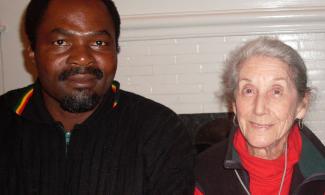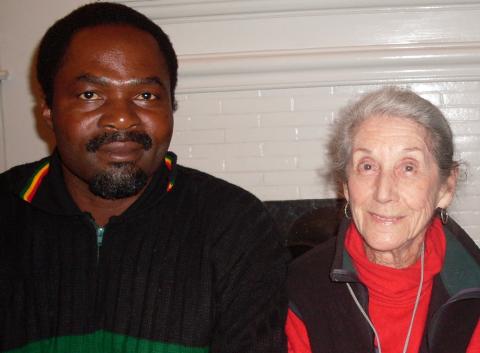
With a book-length manuscript of The Heresiad, my unpublished anti-censorship epic meant as a gift for Nadine, we arrived her house in the company of Phakama Mbonambi, a close associate of Raks. For such a revered writer and global figure, I was surprised that she would keep me completely at ease for the nearly two hours’ duration of our meeting. Not hers the airs I had sometimes noticed from some far less accomplished writers. I could hardly believe that such a great figure could embody such humility.
Even if I was born for a life destined to surprise the unworthy and uplift the underserving, it would still be a rare good fortune that I knew Nadine Gordimer closely, that she adopted me as her friend, that I benefitted from her support as a writer. That I was not born for such a life makes my privilege more special, my gratitude more profound.
I was introduced to Nadine on May 26, 2008, by the South African culture activist Raks Morakabe Seakhoa. He organised the celebration of Chinua Achebe’s Things Fall Apart at 50 in Johannesburg and invited me to take part in a panel discussion and as a performance poet and arranged my meeting Nadine on the side.
With a book-length manuscript of The Heresiad, my unpublished anti-censorship epic meant as a gift for Nadine, we arrived her house in the company of Phakama Mbonambi, a close associate of Raks. For such a revered writer and global figure, I was surprised that she would keep me completely at ease for the nearly two hours’ duration of our meeting. Not hers the airs I had sometimes noticed from some far less accomplished writers. I could hardly believe that such a great figure could embody such humility.
“Poetry is closer to the essence,” she said, comparing the purity of the literary genres after she offered me a seat on a settee and sat right next to me. Then she opened my manuscript and proposed a reading game. She requested that we took turns reading from the poem, a line at a time. She reciprocated to my gift of the manuscript after the reading with a gift of her collection of short stories, Beethoven was One-sixteenth Black, autographed “For Ikeogu Oke – To mark the pleasure of our meeting…”, a pleasure she made far more mine.
Before we left she told me how she cherished the memory of her visit to my country to take part in an event held in honour of Wole Soyinka. Then she took me to a secluded corner and showed me a handwritten birthday message Soyinka had sent her, her eyes radiant with pleasure, in which Soyinka apologised for his unavoidable physical absence to celebrate with her and added with touching humour that if she heard “a glug” at the stroke of midnight it was him drinking to her health. For me it was an unforgettable initiation into literati privilege.
She was a gracious and untiring mentor. When I called her after my return to Nigeria she would regularly ask me “What are you writing now?” and say “Send it to me!” after I have told her. Following the publication of my second book of poems, Salutes without Guns, I sent her a copy through Raks. I was surprised by her letter thanking me for the book and praising the poems. But a greater surprise from her awaited me: Later, the Nigerian journalist Tolu Ogunlesi notified me of her selection of the book as her Book of the Year (2010) for the Times Literary Supplement (TLS) – jointly with the novel Point Omega by the American writer Don DeLillo. Tolu then sent me a copy of the TLS in which the selection was published. I couldn’t believe that a writer of her galactic stature would remark of a struggling writer like me (and stake her reputation with the remark by having it published in the TLS): “Here is a writer who finds the metaphor for what has happened and continues, evolves, not often the way we want in our lives in Africa and the world. He does so timelessly and tellingly, as perhaps only a poet can.” Her life, marked by such extraordinary gestures, was an eloquent testimony of grace.
“What are you writing now,” she asked me again during a telephone conversation about a year later. “Send it to me,” she said enthusiastically after I told her that I had just finished work on a new collection of poems, In the Wings of Waiting. I sent her the manuscript with a letter requesting her to write a Foreword for the collection; and I would have understood if she ignored or turned down the request. She called me a few weeks later. “I have read your manuscript,” she said excitedly. “I love the poems. I will write you the Foreword on one condition.” “What condition?” I wondered, concerned that I may be unable to meet her condition. “Remove the two poems you dedicated to me in the connection. I will not write a Foreword for a collection in which poems are dedicated to me. There is nothing wrong with your dedicating poems to me. I am grateful. But I do not want anyone to think that I wrote the Foreword in exchange for the dedication. Your works merit it. Your erotic poems are some of the best I have read. I do not say things I don’t believe in. I will send you the Foreword in two weeks,” she said, riveting me to a spot as I marvelled at her unique way with integrity, evident in her insistence that I excised the poems dedicated to her in the collection as her condition for writing the Foreword. I received the Foreword in the post with her handwritten note dated exactly two weeks from the date of that conversation. She kept her word with precision! Unstinting in her appreciation of other writers regardless of stature, one phrase stuck out most memorably from the Foreword: “No end to the wide illumination in the protean gifts of this man.”
I called to congratulate her on her ninetieth birthday. “Thank you, Ikeogu... I can’t believe I have got to ninety... I never wanted to... But you know we can’t decide such things,” she said after my felicitation. And I wondered if she belonged to a different world from the rest of us who prized longevity beyond curtailment. She had apologised for cutting our conversation short to prepare for “a precious visit” from her daughter, indicating that she put her children first as every good parent should.
Before leaving Nigeria for the 2014 African Literature Association conference held at the University of Witwatersrand, Johannesburg, I called to let her know that I would be visiting her country once more. She wished me a safe trip and asked me to let her know as soon as I arrived Johannesburg. I called her after I arrived Johannesburg on April 4, 2014. “I want to invite you to my house for a drink. Come no later than 5.30. I want you to meet my friends,” she said, sounding persuasive rather than peremptory.
Long after 5.30 I was still locked in traffic with a cabby who didn’t seem to know his way. I called to let her know, suspecting she would call off the appointment, the time having elapsed. “Give the phone to the driver,” she requested. I did. And she patiently gave directions to the driver and told me she would wait after he returned the phone to me.
It was a rare evening spent in the company of her friends: Maureen Isaacson, Mary Beth and David Goldblatt. I was meeting the last two for the first time. Holding court, she steered our conversation effortlessly from the Pistorius trial in her country to the Boko Haram insurgency in mine, from literature to religion. And poetry was not left out of the bounties we shared at that gathering: I also read and sang “The Tree” to everyone’s delight, a poem I dedicated to her, in which I acknowledge her as “Mother of what I am and all that I may become”.
Before leaving I offered her an autographed copy of The Lion and the Monkey, my children’s story first published in Nal’ibali, a South African journal based at the University of Cape Town, and Song of Success, my collection of poems for children published (with a sing-along CD) by HEBN, Ibadan. “Do you have all my books?” she asked as she received the books from me, her eyes agleam. “No,” I said. “Which ones do you have?” I mentioned those. Then she asked for one of her books. With an autograph that read “…Ikeogu Oke. With much love and celebration of your work.” she handed me a copy of My Son’s Story, her book brought by Maureen Isaacson. Then she said: “We must always give back”, a remark for which I thought Mahatma Gandhi should have added “Taking without Giving” to his famous list of deadly sins.
“When I return to Nigeria I will send you a copy of The Second Genesis. It is an anthology of contemporary world poetry published in India, in which the poem I have just performed for you is published,” I said as I gazed at the autograph in her now unsteady handwriting. “That’s if I’ll still be around,” she replied, hinting at something for which everyone present, except her, glanced at the next person apprehensively. “You’re not going anywhere,” I said after a long frozen silence.
I received news of her death, on July 13, 2014, before I could send her the book with the poem. So, as she had hinted, she would not be around to receive the book if I sent it.
The most valued of the many precious things I got from her are the words: “I do not say things I don’t believe in” and “We must always give back”. For with them came her most prized lessons of integrity and positive reciprocity, by subtly urging me never to say things I don’t believe in and never to fail to give back. I have gratefully internalised both lessons. And to her now posthumous credit, I recently evoked them in “A Parable of Godknows”, a poem inspired by my compatriot Dr. Godknows Igali, another remarkable giver.
I salute her life of courage, grace, integrity, sacrifice, service, and tireless giving. She was, beyond a great writer and humanist, a philanthropist of virtue.
Email: [email protected]; Tel: +234-(0)8034531501
PS: Photo caption: Nadine Gordimer and Ikeogu Oke at Nadine's home in 2008. Photo credit:
